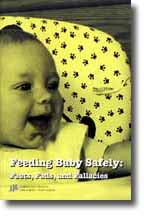 Both commercial and homemade baby foods can be safe and nutritious if used appropriately. To provide their infants with a healthful diet, parents need to choose foods wisely, introduce them correctly, and follow appropriate safety precautions:
Both commercial and homemade baby foods can be safe and nutritious if used appropriately. To provide their infants with a healthful diet, parents need to choose foods wisely, introduce them correctly, and follow appropriate safety precautions: Both commercial and homemade baby foods can be safe and nutritious if used appropriately. To provide their infants with a healthful diet, parents need to choose foods wisely, introduce them correctly, and follow appropriate safety precautions:
Both commercial and homemade baby foods can be safe and nutritious if used appropriately. To provide their infants with a healthful diet, parents need to choose foods wisely, introduce them correctly, and follow appropriate safety precautions:
To prevent burns, always check the temperature of heated foods before serving.
Use safe food-handling procedures to prevent the introduction and growth of disease-causing bacteria.
Never feed unpasteurized apple juice, juice blends containing unpasteurized apple juice, or unpasteurized apple cider to infants.
Never feed infants foods that pose a high risk of choking, such as whole hot dogs, hot dog "coins," peanuts, hard candies, or raw carrots.
Because of the possibility of contamination with the microorganism that causes infant botulism, never feed honey or corn syrup to infants under the age of one year.
Because of the possibility of excessively high levels of nitrate, it may be best not to home-prepare beets, carrots, collard greens, turnips, or spinach for infants under the age of 6 months. Parents who prepare their own baby food should consult with the infant's health-care provider for individualized advice on this subject.
Severe tooth decay can occur if an infant habitually drinks any carbohydrate-containing liquid (milk, formula, or juice) from a bottle at bedtime or sips from a bottle continually during the day. If an infant wants a bottle at bedtime or likes to carry one around, the bottle should be filled with plain water.
To minimize problems with food allergies and other types of food sensitivity, parents should:
- wait until an infant is four to six months old before introducing solid foods;
- introduce new foods or ingredients one at a time in order to detect those that may cause allergic reactions; and
delay the introduction of foods that are particularly likely to provoke allergic reactions.
For good nutrition, parents should:
- breast feed or use iron-fortified infant formula throughout the first year of life;
- let the infant decide how much food to eat;
- make sure that infants over 4 to 6 months of age receive some supplementary source of iron;
- not feed any fruit juice in greater than the recommended amount (water can be given instead if the infant is thirsty); and
- not apply adult dietary guidelines (such as the recommendation to limit intakes of fat and cholesterol) to infants.
Salt does not increase infants' acceptance of foods; sugar does. Neither of these substances is a necessary baby-food ingredient. However, neither is known to be harmful when consumed in small amounts.
The flours and modified starches that are used to thicken some commercial baby foods do not harm an infant's health.
The minute amounts of pesticide residues found in some baby foods are not a cause for concern. The amounts of pesticides found in commercial baby foods are usually lower than those found in regular produce. The nutrient content of commercial baby foods is comparable to that of properly prepared homemade baby foods.
On an ounce-for-ounce basis, commercial baby foods are more expensive than regular products intended for adults. However, parents should realize that they are paying for the convenience of avoiding the extensive labor involved in baby-food preparation and for the security of having sanitary, shelf-stable products that are easy to handle and store safely.
For individualized advice on all aspects of infant feeding, parents should consult with their infant's health-care provider.


